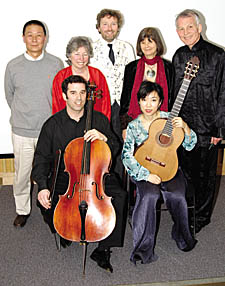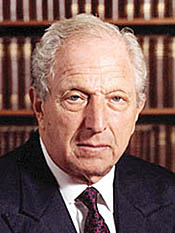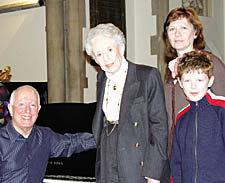|
|
 |
| |
The finest legal minds agree about our 'elected dictator'
THE word ‘dictatorship’ was in the air as some
of the country’s most eminent jurists assembled at the
London School of Economics on Tuesday.
Their target was the government but the lawyers were too polite
to speak so bluntly.
They used the word ‘executive’ – and the audience,
which included lots of law students – knew what the word
meant.
Lecturing the assembly was Lord Woolf (pictured), the former
Lord Chief Justice, who, it is believed, retired two years ago
– four years early – after becoming enmeshed with
government ministers critical of his pronounced liberal views.
One of his ‘crimes’ was to advise fellow judges not
to jail first-time offenders.
At one point, the in-and-out home secretary David Blunkett,
never one to use pretty words when a sledge hammer approach
will do, called Lord Wolf ‘a confused old codger.’
Blunkett could have surprised me!
Lord Woolf, a benign elderly figure, spoke pithily and cautiously,
as you would expect from a man whose legal brain is so widely
admired among lawyers.
His weighty topic was Democracy and the Rule of Law, and he
made it clear you can only have real democracy where the ‘executive’
and the judiciary are independent of each other.
He didn’t make a frontal attack on Blair’s government
but in his coded way he was emphasising that the government
often tried to cross the line.
Less shy was Nicola Lacey, a professor of law at the LSE, who
used the phrase ‘elective dictatorship’ first coined
in the 1960s by Lord Hailsham. Lacey then pointedly said such
‘dictatorships’ were likely to occur when a government
had too big a majority – a reference to Blunkett’s
megaphone politics at a time when Blair had a majority of 150
seats.
Answering questions, Lord Woolf decried the way legal aid had
been run down under New Labour. Another speaker, Michael Smyth,
a partner in Clifford Chance, a global firm of solicitors, described
the legal aid system as one of the great achievements of the
post-war Labour government – as great as the NHS –
and bemoaned the way it had been treated by Labour 60 years
later.
The princes of darkness
HOW many workmen does it take to dig a hole?
That was a question my colleagues and I had plenty of time to
ponder by candlelight on Friday afternoon, when a crew re-laying
pavement outside our Camden Road, Camden Town, offices put a
pneumatic drill through an electricity cable, plunging us and
neighbouring shops into darkness until nearly the evening.
A sign posted by the Transport for London – run by the
Mayor – helpfully informed me that it was responsible for
the work, which it had contracted to a firm called Ringway and
was being overseen by Camden Consulatancy Services, a branch
of the Town Hall.
But the man who struck the deadly blow to the cable, it turned
out, worked for a firm called Orbital Equipment – a sub-contractor
of Ringway.
Sadly, despite the involvement of two agencies of the state
(TfL and the Town Hall) and two teams of private workmen (Ringway
and Orbital) nobody could do anything about our power supply
until EDF Energy, the electricity company, arrived two-and-a-half
hours later.
Afraid of being outnumbered, the EDF man had brought along his
own sub-contractor, a chap from a firm called McNicholas.
Mr EDF told me: “I do this all day, every day, all over
London – there’s about 200 more vans doing more or
less the same thing.
“There’s always an idiot going through the cable somewhere.”
A Ringway spokesman said: “The cable was in the wrong place.”
A Town Hall press official said: “You’re not going
to try to pin this on us, are you? The contractor is responsible.”
I was going to call TfL, McNicholas and Orbital as well, but
I could see where this was going.
Ever since all public contracts were put out to tender under
Mrs Thatcher, it’s been easier to find eight workmen from
six different firms standing in a circle scratching their heads
than a contractor who takes responsibilty.

Back row from left: Calligrapher Qu Lei Lei, poet Judith
Cherniak, singer Richard Edgar-Wilson, poet Cicely Herbert,
Piers Plowright. Front row: David Cherniak and Yang Xuefei
|
Rhyme and reason in cultural exchange
THE consulvsions in the streets of Europe this week over
the publication of a cartoon in a Danish newspaper reminds me
of China 40 years ago when the Cultural Revolution was said
to have been triggered by a critical review of a classical play.
The criticism of the main character was seen as a coded attack
on Mao Tse Tung!
It just shows how careful you have to be with the printed word.
Or a cartoon, for that matter. I don’t want to encourage
anyone to lay siege to No 10 Downing Street but I thought of
Blair and the Iraq war when I heard a poem of the 1930s by the
great Chinese writer Lu Xun at the British Library on Monday.
“The general sits safe on his cloud-wrapped peak,”
recited Piers Plowright “While thunderbolts slaughter the
humble in their hovels.”
That’s Blair for you, I thought. Always keen to send the
boys off to war while he sits comfortably in No 10.
Piers Plowright, a former distinguished BBC documentary maker,
who lives in Hampstead, was taking part in a ‘cultural
exchange’ between London and Shanghai – Chinese poems
went up this week in the London underground while English poems
were placed on the Shanghai Metro.
Apparently, the Chinese chose poems by the great radical poets
Shelley and Byron both of whom are known for stirring stanzas
calling on the poor and the oppressed to rise up from “their
slumbers”.
However, the Chinese government played safe – and chose
two romantic poems by the masters instead.
Lovingly remembering Lennie
RETIRE? He didn’t know the meaning of the word. After
stepping down from his post as a director in the packaging industry,
Lennie Lourie took up another post. This time as a teacher of
French at the University of the 3rd Age (U3A) in Camden Town.
His adult education work only ended two years ago when in his
late 80s he was paralysed in an accident.
Naturally, relatives, friends and ex-colleagues were keen to
honour Lennie who had made such an impact on their lives as
both teacher and chairman of U3A.
On Sunday they assembled at the Rosslyn Hill Chapel in Hampstead
in memory of Lennie who died last November.
Highlight of the afternoon was a performance by the Double Image
classical ensemble who played Glinka, Chopin and Brahms.
His wife, Friends of the Royal Free Hospital president Wiera
Lourie, told me he never lost interest in the U3A.
“He was very involved right up until the day he died,”
she said. “A lot of his visitors were members and his conversations
with them were around it – he very much believed in it.”
Mrs Lourie said he would also have to see so many of his old
friends and colleagues at the event. She said: “He would
have loved it.”
Pictured: David Carhart and Mr Lourie’s widow Wiera, daughter
Alina and nine-year-old grandson Alfie Habershon.

|
|
 |
|




